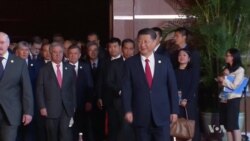Chinese President Xi Jinping says countries participating in the two-day Belt and Road Forum have agreed to an action plan with a list of 270 goals
Speaking at the end of the forum, China's leader said the 30 heads of state who attended the summit in Beijing and nearby Yanqi Lake signed a communiqué to promote an open global economy, rebalance globalization, and deepen trade liberalization.
Xi's Belt and Road development initiative focuses on connectivity and cooperation among countries primarily China and the rest of Eurasia. It includes the land-based "Silk Road Economic Belt" and the oceangoing "Maritime Silk Road".
The strategy underlines China's push to take a bigger role in global affairs. Xi stressed China would not base cooperation on ideology or use the Belt and Road to pursue a political agenda, allaying concerns of critics who have highlighted the massive project’s possible geopolitical impact.
“We have every reason to have full confidence in the prospects for the Belt and Road initiative,” Xi said. “At the same time, the Belt and Road initiative is an expansive project and the road ahead is very long and cooperation is key.”
Expansive Belt and Road
Although many of the more than 100 countries and organizations participating in the summit welcome China’s efforts to boost trade and to play a bigger role in global affairs, participation in the forum was mixed. Some countries sent representatives, but have yet to officially back the project.
The forum included representatives from the United States and North Korea.
Countries such as the United States and Germany have emphasized the need for transparency and a level playing field.
“Germany as a country has not asked to be a part of the initiative, but German companies have asked to be part of it,” said Brigitte Zypries, German Minister for Economic Affairs and Energy, who attended the forum. “It is obviously relevant to know what is going to be built and the procedures to take part in this building are the same for every company and every country.”
“The Belt and Road Initiative originates from China, but it belongs to the world,” Xi said, in remarks before the leaders' summit Monday. “The Belt and Road construction spans different regions, development phases and civilizations. It is an open and inclusive cooperation platform.”
Sunday, Xi outlined his vision for the plan and pledged to use development to fight a wide range of problems from terrorism to poverty. Xi's plan involves the creation of six economic corridors that would link China to 65 countries. The participation of those countries would account for 60 percent of the world's population and 30 percent of global GDP.
An estimated $900 billion would be spent on connectivity projects across land and sea, making the Belt and Road initiative the most expensive development plan in history, several times larger than the U.S. Marshall Plan that was used to rebuild Europe after World War II.
China has offered to shoulder a big slice of the responsibility, pledging $124 billion, which is double of what the World Bank lent in 2016. Analysts said Beijing can easily bear the burden. China has foreign exchange reserves exceeding $3 trillion. Last year, Chinese companies invested $170 billion in overseas projects.
Empire building
Xi offered to establish 50 scientific laboratories with participating countries, train 5,000 foreign scientists and invited 500 foreign research groups to visit China. The plan will also launch 100 "happy home" projects, 100 poverty alleviation projects and 100 health care and rehabilitation projects in countries along the Belt and Road, he said.
But based on how the project has been outlined, China appears to be trying its hand at a new form of economic colonization, said Mohan Malik, a professor at the Institute of Asian Security in Hawaii.
“China is in an empire-building mode: an empire of exclusive economic enclaves that would create a Sino-centric unipolar Asia,” Malik said in an emailed response. “Chinese officials, in jest, talk of buying off smaller countries instead of invading them.”
Malik adds that with its slowing economy, China risks “imperial overreach” with such a massive venture.
David Kelly, director of research at the private China Policy consultants said if successful the outcome could be a positive thing, but the Belt and Road is swiftly becoming a measure of China’s global standing.
"But if it doesn’t work, if it runs into problems, if it’s impractical, if it’s too costly, if it falls over, it will cost China’s standing in the world. And that is what worries people because it is essentially an educated bet, an educated gamble,” Kelly said.





